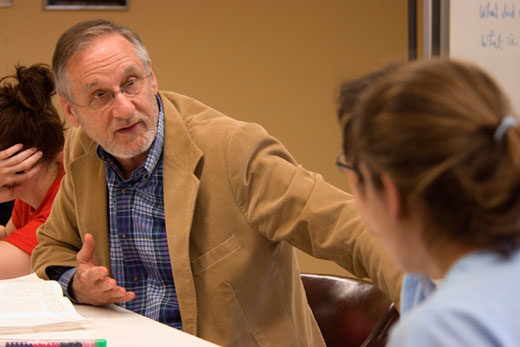Professor of English Clark Lemons began teaching at Oxford College 30 years ago. The Emory alum also directs Oxford's theater program.
For Oxford's 2012 spring production, Lemons has selected "8," a play by Dustin Lance Black, the Academy-award winning screenwriter of "Milk" and "J. Edgar." "8" chronicles Perry v. Schwarzenegger, the landmark 2011 trial that challenged California's passing of Proposition 8, which restricted the state's definition of marriage to opposite-sex couples only.
The play speaks to the historical context of marriage from expert testimony and illustrates the human cost of discrimination. The Oxford Drama Guild will perform "8" on March 1 and March 2 at 7:30 p.m. and March 3 at 3 p.m. in Tarbutton Theater.
Lemons talks about the theater experience at Oxford:
What do you want your actors and the audience to get from the experience of theater?
I think theater is part of a total liberal arts experience. Liberal arts can be studied from an intellectual standpoint, but it should be more than that. In theater it is necessary to study context, psychology and literary value—and the actors must embody these. Theater means body, mind and spirit. I want my student actors to learn how to present themselves in public and how to focus on a character to the point of being that person.
I select plays that will be powerful for both the actors and the audience. We don't do big musicals here or comedies that aren't intellectually challenging for the audience. I want our productions to be ones that young student actors can succeed with, but I also want them to be thought-provoking, helping everyone involved think in new ways. We've done such works in the recent past as "The Exonerated," about innocents on death row; "The Laramie Project," the beating death of a gay teenager; and "Prelude to a Kiss," issues of aging. Our production this spring of "8" will be the first time it has been produced in Georgia, and Oxford is only the fourth college in the country to stage the play.
Your first postgraduate work was a master's of divinity degree. What brought you from seminary to the theater?
My father is a Methodist minister, and I always had the sense that I wanted to make my own career a calling, no matter what it was. I went to Union Theological Seminary suspecting that I would eventually choose teaching, community development or some form of social action. At the time I was there, fewer than half of the students intended to be parish ministers. In my own case, my thesis dealt with Tolstoy's ideas on freewill and determinism. My acting experience goes back to high school, but I did very little theater in college—in fact, I took no theater courses. But after I completed my doctorate in English at Emory, I joined the faculty at the Marist School in Atlanta, and they asked me to direct plays and teach speech as well as literature. A few years later I came to Oxford. With the job offer I was also asked if I could direct plays, and I said yes.
How has the theater program at Oxford changed in the last three decades?
When I first came, there was not a dedicated theater venue. Plays were performed in Phi Gamma Hall—built in 1851 as a meeting space for one of Emory's then-literary societies. There was a lot we had to do to make that space work, including turning on gas space heaters an hour before rehearsals in the winter. But since 2001, thanks to a gift from Gena and Hugh M. Tarbutton, Sr. '53Ox-'55B we have had the Tarbutton Performing Arts Center, and that has made a great deal of difference. Despite everything, I don't think students have changed all that much—they still love to be on stage.
What is your goal in general for your students?
I hope they have been changed in some way, transformed. I think that is always the goal of teaching—to give our students and ourselves a better understanding of the world.

